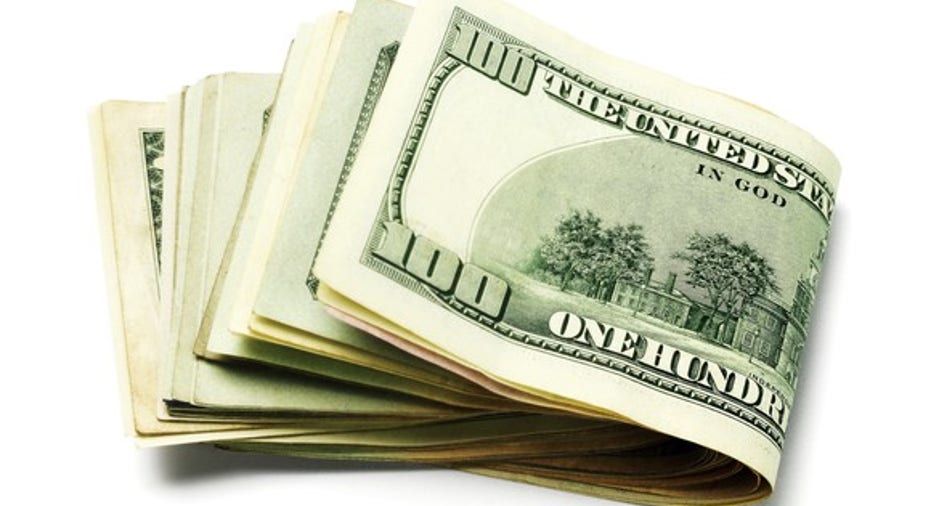4 Smart Things You Can Do with $1,000 Right Now: The Tax Edition

It's not every day that an extra $1,000 falls in your lap. Whether you're sitting on a bonus check from your company, a birthday gift from a generous relative, or an unexpected inheritance, it pays to use that money wisely rather than blow it on something frivolous. And with tax season in full swing, now's the time to think about how that money might benefit you from a tax perspective. Here are a few key moves you ought to consider.
1. Pay your tax bill
First, the obvious. If you owe the IRS money and have $1,000 at your disposal, the foremost thing you should do is use that cash to pay off your balance in time for the April 18 tax filing deadline. If you don't pay your tax bill on time, you could face a late-payment penalty equal to 0.5% of what you owe every month until you pay off your balance in full, up to a maximum of 25% of the balance.
IMAGE SOURCE: GETTY IMAGES.
Not only will it cost you if you wait to give the IRS what it's owed, but if you don't at least make an effort to pay those taxes -- by paying in installments, for example -- the IRS might go so far as to garnish your wages to recoup its money. Granted, the agency won't take this step without first serving notice and giving you an opportunity to get on a payment plan, but the point is that if you have the means to start chipping away at your tax bill, you'd be wise to make that your top priority.
2. Contribute to your IRA
Many Americans don't save for retirement because they don't have the cash to do so. But if you have an extra $1,000 to work with, it pays to use that money to fund your IRA. In fact, you have up until the April 18 tax filing deadline to contribute to your IRA for the purposes of tax year 2016, meaning you can lower your taxable income for last year.
Because traditional IRA contributions are made with pre-tax dollars, funding your account means reducing your tax burden. Your specific tax savings will depend on your effective tax rate, but if you ultimately pay 13.5% on all your income (like the average American), then a $1,000 IRA contribution will shave $135 off your tax bill.
Of course, you could also use that $1,000 to contribute to your IRA for 2017, but if you haven't maxed out your 2016 contributions, you're better off applying that cash to the previous tax year. The reason? You still have many more months to save money in your IRA for 2017, but the window to contribute for tax year 2016 is rapidly closing, so you might as well focus on 2016 first.
3. Invest in your business
If you're self-employed and that $1,000 buys you a new laptop or similarly useful piece of equipment, you'd be wise to make that investment. Not only might it improve your productivity, but you're allowed to take a tax deduction for direct business expenses, which are costs you incur specifically in the course of doing business.
There's more than one way to take a deduction for business equipment. You can either write off the entire cost of your purchase immediately or spread out your deduction over the course of the item's useful life. Let's say you spend $1,000 on a laptop used solely for business. You can either take a full $1,000 deduction the year you buy it, or you can spread that deduction over five years if you expect the laptop to last that long. Though you might jump to take the initial deduction in full, if you anticipate an uptick in business in the coming years, it might make sense to reserve a portion of that deduction for the future.
4. Complete that home improvement project
Improving your home could save you money on taxes when the time comes to sell your property. Whenever you make an improvement, such as adding a fence or finishing a basement, the costs you incur are added to your home's tax basis. Why is this important? The higher your cost basis, the less of a gain you'll realize if you sell your home at a profit.
Thanks to the rather generous exemptions for capital gains on a home, you won't pay taxes on the sale of your property unless your profit exceeds $250,000 as a single tax filer or $500,000 as a joint filer. (You'll also need to have lived in your home for two of the five years prior to the sale in order to claim the exemption.) But if you spend your newfound money to complete a home improvement project and later make a killing on the sale of your property, you could wind up saving yourself some capital gains taxes.
Of course, there are plenty of smart things you can do with $1,000 that aren't tax-related. You might, for example, build your emergency fund, pay down credit card debt, or invest in stocks for the first time. No matter what you do with that cash, be sure to use it responsibly so that it serves you well in the long run.
The $16,122 Social Security bonus most retirees completely overlook If you're like most Americans, you're a few years (or more) behind on your retirement savings. But a handful of little-known "Social Security secrets" could help ensure a boost in your retirement income. For example: one easy trick could pay you as much as $16,122 more... each year! Once you learn how to maximize your Social Security benefits, we think you could retire confidently with the peace of mind we're all after.Simply click here to discover how to learn more about these strategies.
The Motley Fool has a disclosure policy.



















